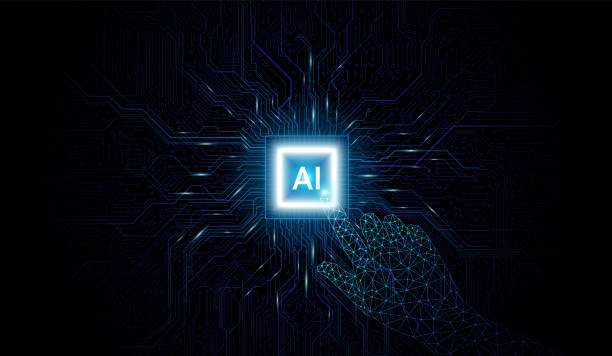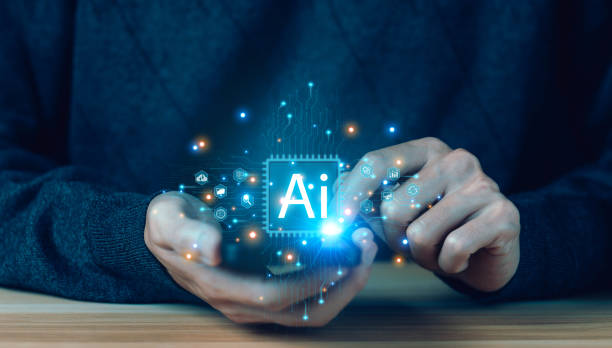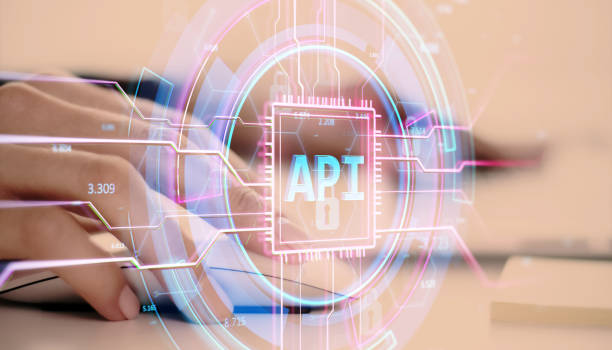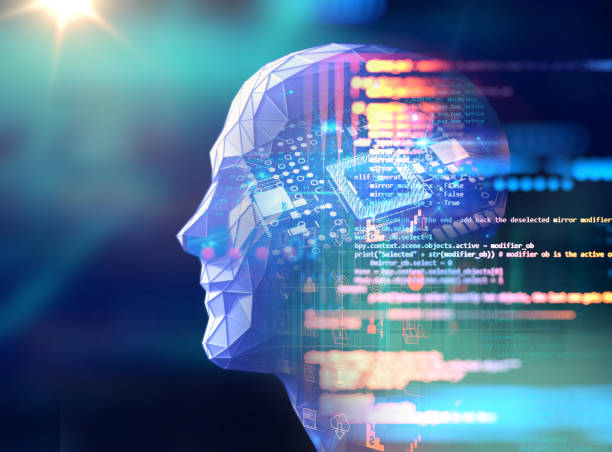What is Artificial Intelligence and Why is it Important?

What is Artificial Intelligence and Why is it Important?
#Artificial_Intelligence (AI) is a branch of computer science that deals with building machines capable of performing tasks that usually require human intelligence.
These tasks include learning, problem-solving, pattern recognition, natural language understanding, and decision-making.
The importance of artificial intelligence in today’s world is undeniable.
AI, with Artificial Intelligence, not only changes the way we live but also transforms various industries.
From medicine and automotive to finance and education, AI is improving efficiency, reducing costs, and creating new opportunities.
In summary, artificial intelligence allows systems to learn from data, adapt themselves, and perform tasks that were previously only possible by humans.
These capabilities have made AI one of the most important technologies of the current era.
With the ever-increasing spread of data and hardware advancements, the role of artificial intelligence in our lives is expected to become more prominent.
Due to the immense importance of artificial intelligence, many organizations are striving to make the best use of this technology and are working to maximize its benefits.
AI is so crucial that the future of companies and organizations is directly related to their adoption of artificial intelligence and/or machine learning.
How much does losing business leads due to an unprofessional website cost you? Solve this problem forever with professional corporate website design by Rasawab!
✅ Increase credibility and trust of potential customers
✅ Easier acquisition of new business leads
⚡ Get a free consultation now!
Types of Artificial Intelligence | From Narrow Systems to General Intelligence

Types of Artificial Intelligence | From Narrow Systems to General Intelligence
Artificial intelligence can be divided into several main categories based on capabilities and functionality:
- Narrow AI: This type of AI is designed to perform specific tasks.
Examples include voice assistants like Siri and Alexa, movie recommendation systems on Netflix, and facial recognition software.
Narrow AI is highly efficient in its specialized domain but cannot perform tasks outside of it. - General AI: This type of AI possesses intelligence equivalent to human intelligence and can perform any task that a human is capable of.
No General AI has been fully developed yet, but researchers are striving to achieve this goal. - Super AI: This type of AI surpasses human intelligence and can outperform humans in all areas.
The existence of Super AI is still hypothetical, and its implications for humanity are unpredictable.
Understanding these classifications helps us better comprehend the capabilities and limitations of each type of artificial intelligence and how it can be used in various fields.
With technological advancements, it is expected that the boundaries between these categories will blur, and we will witness the emergence of more intelligent systems.
Machine Learning | The Beating Heart of Artificial Intelligence

Machine Learning | The Beating Heart of Artificial Intelligence
Machine Learning is one of the most important subfields of Artificial Intelligence that enables machines to learn from data without explicit programming.
In other words, instead of being given precise instructions for a task, they identify patterns by analyzing data and make decisions based on them.
Machine learning is divided into three main categories:
- Supervised Learning: In this method, the machine is trained using labeled data.
This means that for each input, the expected output is also specified.
Examples include spam email detection and stock price prediction. - Unsupervised Learning: In this method, the machine is trained using unlabeled data.
The goal is for the machine to identify hidden patterns and structures in the data.
Examples include customer clustering based on purchasing behavior and dimensionality reduction. - Reinforcement Learning: In this method, the machine learns how to best perform a task by interacting with the environment and receiving rewards or penalties.
Examples include playing video games and controlling robots.
Machine learning plays a very important role in the development of artificial intelligence, enabling machines to learn and make decisions autonomously and without human intervention.
| Type of Learning | Description | Examples |
|---|---|---|
| Supervised Learning | Training with labeled data | Spam email detection, stock price prediction |
| Unsupervised Learning | Training with unlabeled data | Customer clustering, dimensionality reduction |
| Reinforcement Learning | Learning through interaction with the environment and receiving rewards/penalties | Playing video games, robot control |
Deep Neural Networks | A Model Inspired by the Human Brain

Deep Neural Networks | A Model Inspired by the Human Brain
Deep Neural Networks are a type of artificial neural network composed of multiple layers of nodes (neurons).
These networks are designed inspired by the structure and function of the human brain and are capable of learning complex patterns in data.
Each layer in a deep neural network extracts specific features from the data.
Initial layers identify simpler features such as edges and colors, while deeper layers detect more complex features such as objects and concepts.
By combining these features, the deep neural network can accurately and comprehensively understand the data.
Deep neural networks have made significant advancements in recent years in various fields such as computer vision, natural language processing, and speech recognition.
Examples include facial recognition, machine translation, and text generation.
These advancements have made deep neural networks one of the most powerful tools in artificial intelligence.
Do you dream of a thriving online store but don’t know where to start?
Rasawab is your comprehensive e-commerce website design solution.
✅ Attractive and user-friendly design
✅ Increased sales and revenue⚡ Get a free consultation
Applications of Artificial Intelligence in Daily Life
![]()
Applications of Artificial Intelligence in Daily Life
Artificial intelligence has increasingly permeated our daily lives and has applications in various fields.
Some of these applications include:
- Voice Assistants: Voice assistants like Siri, Alexa, and Google Assistant use AI to understand voice commands and perform tasks such as playing music, setting reminders, and answering questions.
- Recommendation Systems: Recommendation systems on various platforms like Netflix, Amazon, and YouTube use AI to suggest products and content that might be appealing to users.
- Self-driving Cars: Self-driving cars use AI to understand their surroundings and drive without human intervention.
- Facial Recognition: Facial recognition technology is used in smartphones, security cameras, and social media to identify individuals.
- Machine Translation: Machine translation services like Google Translate use AI to translate texts from one language to another.
These are just a few examples of AI applications in our daily lives.
With technological advancements, AI applications are expected to become more widespread and diverse.
Challenges and Limitations of Artificial Intelligence

Challenges and Limitations of Artificial Intelligence
Despite significant advancements in the field of artificial intelligence, there are still challenges and limitations that need to be addressed:
- Need for Large Amounts of Data: Many AI algorithms, especially deep neural networks, require vast amounts of data for training.
Collecting and labeling this data can be time-consuming and costly. - Interpretability: In some cases, understanding why an AI system made a particular decision is difficult.
This issue can reduce trust in the system and limit its use in sensitive areas such as medicine and law. - Bias: If the training data for an AI system contains bias, the system may also act biasedly.
This issue can lead to discrimination and inequality. - Security: AI systems may be vulnerable to cyberattacks.
Hackers can manipulate the training data or system algorithms to alter its behavior and use it for malicious purposes. - Ethical Issues: The development and use of AI raise important ethical questions.
For example, should self-driving cars prioritize saving the driver’s life or pedestrians’ lives in the event of an accident?
To address these challenges and limitations, further research and the development of new approaches in artificial intelligence are needed.
The Future of Artificial Intelligence | What Should We Expect?

The Future of Artificial Intelligence | What Should We Expect?
The future of artificial intelligence is very bright and full of potential.
AI is expected to play a much more significant role in our lives in the coming years and bring about enormous transformations in various industries.
Some expectations for the future of AI include:
- Advancements in General AI: Researchers are striving to achieve General AI, a system capable of performing any task a human can.
- Expansion of AI Applications: AI applications are expected to expand into various fields such as medicine, education, agriculture, and manufacturing.
- Creation of New Jobs: The development and use of AI will create new job opportunities.
- Increased Productivity and Efficiency: AI can help increase productivity and efficiency in various industries.
- Improved Quality of Life: AI can help improve the quality of human life in various fields such as healthcare, education, and transportation.
However, we must also pay attention to the challenges and limitations of artificial intelligence and strive to solve them.
Responsible development and use of AI can help create a better future for everyone.
| Field | AI Application | Benefits |
|---|---|---|
| Medicine | Disease diagnosis, drug development | More accurate diagnosis, accelerated treatment process |
| Education | Personalized learning, smart educational systems | Increased learning, easier access to education |
| Transportation | Self-driving cars, traffic management | Reduced accidents, improved efficiency |
| Finance | Fraud detection, risk analysis | Reduced losses, improved decision-making |
How to Enter the World of Artificial Intelligence?

How to Enter the World of Artificial Intelligence?
If you are interested in artificial intelligence and want to enter this field, you can start in various ways:
- Learn Basic Concepts: First, you need to learn the basic concepts of artificial intelligence, machine learning, and neural networks.
You can use online courses, books, and educational articles. - Learn Programming Languages: To work with AI, you need to be proficient in programming languages like Python, R, and Java.
Python is one of the most popular languages for AI due to its simplicity and powerful libraries. - Familiarize Yourself with AI Libraries: Powerful libraries like TensorFlow, Keras, and PyTorch exist for developing AI applications.
By learning these libraries, you can easily create and train AI models. - Participate in Practical Projects: To gain practical experience, you can participate in AI projects.
These projects can include building a simple facial recognition system, predicting stock prices, or creating a chatbot. - Attend Courses and Workshops: Participating in courses and workshops can help you improve your skills in artificial intelligence.
With effort and perseverance, you can enter the world of artificial intelligence and succeed in this field.
Are you frustrated with your online store’s low conversion rate?
Rasawab, with professional e-commerce website design, is your definitive solution!
✅ Increase your sales and revenue
✅ Unparalleled user experience for your customers
⚡ Get a free consultation now!
Top Educational Resources for Learning Artificial Intelligence

Top Educational Resources for Learning Artificial Intelligence
Many educational resources are available for learning artificial intelligence.
Some of the top resources include:
- Online Courses: Online learning platforms like Coursera, edX, and Udacity offer various courses in artificial intelligence.
- Books: Many books are available on artificial intelligence that you can use to learn basic and advanced concepts.
- Educational Articles: Many websites and blogs publish educational articles on artificial intelligence.
- AI Libraries: The documentation for TensorFlow, Keras, and PyTorch libraries contains useful information on how to use these libraries.
- Online Forums: Online forums like Stack Overflow and Reddit are good places to ask questions and get help from AI experts.
By utilizing these educational resources, you can improve your knowledge and skills in artificial intelligence.
Artificial intelligence is one of the lucrative fields, which has led many people to pursue learning it.
Impact of Artificial Intelligence on the Job Market

Impact of Artificial Intelligence on the Job Market
Artificial intelligence will have a significant impact on the job market.
Some jobs will be eliminated due to automation by AI, while new jobs will be created.
Some of the changes expected in the job market include:
- Loss of Certain Jobs: Jobs involving repetitive and routine tasks are most at risk of automation by artificial intelligence.
- Creation of New Jobs: The development and use of AI will create new job opportunities in fields such as AI engineering, data analysis, and data science.
- Changing Nature of Jobs: Many jobs will require new skills, such as the ability to work with AI systems and analyze data.
- Increased Demand for Soft Skills: Soft skills such as creativity, problem-solving, and interpersonal communication will become more important.
To prepare for these changes, we need to keep our skills updated and invest in learning new ones.
We should also engage in learning artificial intelligence and using it in daily life.
Frequently Asked Questions
| Question | Answer |
|---|---|
| What is Artificial Intelligence? | It is the simulation of human intelligence in machines programmed to think like humans and mimic their actions. |
| What are the main branches of Artificial Intelligence? | They include Machine Learning, Deep Learning, Natural Language Processing, Computer Vision, and Robotics. |
| What is Machine Learning? | It is a branch of AI that focuses on enabling systems to learn from data and identify patterns without explicit programming. |
| Mention examples of AI applications in our daily lives. | Voice assistants (like Siri and Alexa), recommendation systems on Netflix and Amazon, self-driving cars, and facial recognition software. |
| What is Deep Learning? | It is a subset of Machine Learning that uses multi-layered (deep) artificial neural networks to process large amounts of data. |
| What is Natural Language Processing (NLP)? | It is a branch of AI that focuses on enabling computers to understand, interpret, and generate human language. |
| What are some ethical concerns related to Artificial Intelligence? | They include data bias, privacy, job displacement, and accountability in case of errors. |
| What are the main benefits of Artificial Intelligence? | Increased efficiency, improved decision-making, automation of repetitive tasks, and discovery of complex patterns in data. |
| How is Artificial Intelligence used in healthcare? | In disease diagnosis, drug discovery, medical image analysis, and personalized patient care. |
| How do you see the future of Artificial Intelligence? | It is expected to continue evolving rapidly, affecting all aspects of human life, from industry to education and entertainment. |
And other services of Rasawab Advertising Agency in the field of advertising:
- Smart Customer Journey Map: Transform campaign management with intelligent data analysis.
- Smart Data Analysis: A fast and efficient solution for digital branding, focusing on attractive UI design.
- Smart Custom Software: A novel service to increase customer acquisition through the use of real data.
- Smart Link Building: A specialized service for growing user engagement based on key page optimization.
- Smart Marketplace: An effective tool for customer acquisition with the help of marketing automation.
And over a hundred other services in the field of internet advertising, advertising consulting, and organizational solutions.
Internet Advertising | Advertising Strategy | Advertorials
Resources
Introduction to Artificial Intelligence: From History to Basic Principles
Practical Machine Learning: Algorithms and Implementation
Advanced Applications of Artificial Intelligence in Big Data Analysis
Challenges and Opportunities of Artificial Intelligence in Iran
? Ready to transform your business in the digital world? Rasawab Afarin Digital Marketing Agency, specializing in SEO, content marketing, and corporate website design, is your reliable partner on the path to growth and success.
📍 Tehran, Mirdamad Street, next to Bank Markazi, Kazerun Jonubi Alley, Ramin Alley, No. 6

